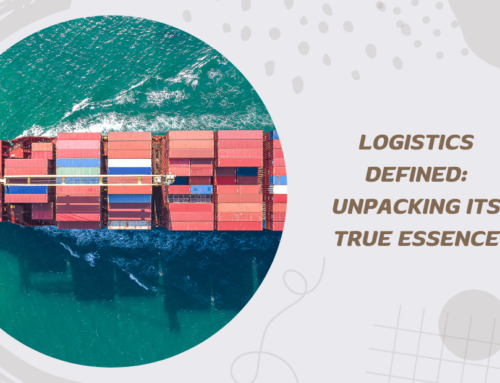The logistics sector stands as a backbone to global trade, offering a plethora of career paths endowed with varying degrees of financial rewards. For aspiring entrepreneurs and professionals keen on venturing into this dynamic field, comprehending the financial landscape of logistics careers in the U.S. is paramount. Such an understanding doesn’t only facilitate strategic career planning but also empowers informed decision-making regarding logistics operations management. This insight into what logisticians genuinely earn across different sectors within the U.S. illuminates the potential financial rewards and challenges, guiding aspiring individuals towards making choices that align with their aspirations and market realities.
Understanding the Basics
In the realm of supply chain management, “logistician” is a term that captures the essence of professionals dedicated to analyzing and coordinating an organization’s supply chain—the heartbeat of global commerce. These individuals take the helm in managing the lifecycle of a product, ensuring its journey from acquisition to delivery is seamless and efficient. As of May 2022, the median annual wage for logisticians stood at $77,520, as reported by the U.S. Bureau of Labor Statistics (BLS). This figure not only underscores a stable and lucrative career path within this vital sector but also highlights the economic value and recognition these professionals command in facilitating global trade.
The role of logisticians is multifaceted, encompassing a broad spectrum of responsibilities that are critical to the efficient operation of the supply chain. They are tasked with overseeing product acquisition, directing the allocation of materials, supplies, and products, and forecasting demand to align with supply flows. Furthermore, logisticians play a pivotal role in risk management, the selection and implementation of business systems, and proposing strategies to minimize costs or time required to transport goods. Their expertise ensures that logistical functions are reviewed and optimized continually, serving as a liaison between an organization and its suppliers or customers.
The work environment for logisticians is characterized by its fast pace and can sometimes be stressful, necessitating quick problem-solving to keep operations on schedule. The majority of logisticians work full time, and some may work more than 40 hours per week to ensure the smooth execution of logistical tasks. This dedication is a testament to their crucial role in maintaining the flow of goods across various industries, from manufacturing and federal government sectors to professional, scientific, and technical services.
To embark on a career as a logistician, a bachelor’s degree is typically the entry-level requirement, although some positions may accept less formal education supplemented by relevant work experience. Degrees in logistics and supply chain management, business, or related fields are commonly pursued by those entering this profession. Coursework in these programs covers a wide range of subjects, including operations and database management, system dynamics, and software commonly used by logisticians for procurement, inventory management, and supply chain planning.
While not mandatory, certifications in logistics can significantly enhance a professional’s credentials, demonstrating a broad knowledge of logistics and competence in the field. The Association for Supply Chain Management (ASCM) and the International Society of Logistics (SOLE) offer recognized certifications that require meeting education and work experience criteria and passing an examination.
The Role of Education and Experience
Embarking on a career in logistics often begins with the right educational foundation. A bachelor’s degree is typically the cornerstone for entry into this field, with majors in business, systems engineering, or supply chain management being among the most common and beneficial for aspiring logisticians. These programs provide a comprehensive understanding of the complexities of global supply chains, including critical areas such as procurement, transportation, and inventory management.
However, the value of real-world experience cannot be overstated. For many in the logistics field, practical experience, especially in roles closely related to supply chain operations, can be just as crucial as formal education. In some cases, hands-on experience in logistics or a related field may even substitute for formal educational requirements. Employers often look for candidates who have not only theoretical knowledge but also a proven ability to apply that knowledge in practical settings. Internships, co-op programs, or previous roles in logistical support, such as material recording clerks or dispatchers, provide invaluable insights and skills that can significantly enhance a logistician’s expertise and employability.
Certification and Professional Development
While not a universal requirement, obtaining professional certification in logistics is a powerful way to demonstrate a high level of competence and a broad understanding of the field. Certifications can significantly bolster a logistician’s credentials, enhancing job prospects and potentially leading to higher earnings. Organizations such as the Association for Supply Chain Management (ASCM) and the International Society of Logistics (SOLE) offer respected certifications that are recognized across the industry. These certifications often require a combination of education, work experience, and passing a comprehensive exam.
Pursuing continuous professional development is also key in a field as dynamic as logistics. The industry is continually shaped by technological advancements, changes in global trade policies, and evolving market demands. Staying abreast of these changes through further education, workshops, and seminars is crucial for maintaining a competitive edge. Advanced degrees or specialized training in areas like data analytics, information technology, or global supply chain management can open doors to higher-level positions and opportunities for career advancement.
Industry Impact on Earnings
The logistics field, diverse and expansive, reflects a broad spectrum of earnings, significantly influenced by the industry segment one chooses to operate in. For instance, logisticians working within the federal government sector are at the top of the earnings bracket, boasting median annual wages of approximately $91,330. This is a testament to the critical nature of logistics operations in government projects and initiatives, requiring a high level of expertise and responsibility.
Conversely, other sectors such as manufacturing, management of companies and enterprises, and professional services also offer competitive salaries, though they vary. The manufacturing sector, integral to the production and distribution of goods, necessitates efficient logistics operations to maintain supply chains, thereby valuing the logistician’s role highly. Similarly, management companies and professional services firms rely on logisticians to streamline operations and reduce costs, offering attractive compensation for these skills.
Job Outlook and Future Prospects
The logistics profession is on an upward trajectory, projected to grow by 18 percent from 2022 to 2032, a pace much faster than the average for all occupations. This anticipated growth is largely fueled by the expansion of e-commerce and the consequent complexities introduced into global supply chains. The e-commerce boom has not only increased the volume of goods being moved but also raised consumer expectations for delivery speed and transparency, necessitating adept logistics management.
Moreover, the increasing complexity of global supply chains, compounded by factors such as international trade agreements and global sourcing strategies, underscores the demand for skilled logisticians. These professionals are essential in navigating the intricacies of modern supply chains, optimizing operations, and ensuring the efficient delivery of goods in a globalized market environment.
Conclusion: Aiming for Innovation and Sustainability
In navigating the multifaceted landscape of logistics in the U.S., a clear understanding of the financial rewards associated with different sectors, coupled with the projected growth of the field, is invaluable for aspiring entrepreneurs and logistics professionals. The key to unlocking these rewards lies in a foundation of solid education, relevant experience, and, where applicable, specialized certification. As the logistics sector continues to evolve, driven by advancements in e-commerce and the complexities of global supply chains, there is a growing emphasis on innovation and sustainability. Professionals who can incorporate these elements into their logistics strategies not only enhance their market value but also contribute to the development of more efficient, resilient, and sustainable supply chains.










